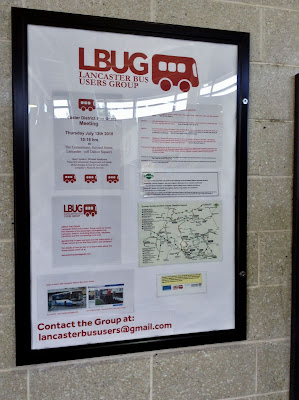 |
| The application form available today on the DaFT website (note the date at the top) |
The Department for Transport's official abbreviation is DfT, but sometimes (quite a lot of the time actually) it appears to live up to its unofficial acronym DaFT!
One such example has just come to light with a significant change to the procedure that bus operators must follow to notify changes to their services being introduced with no notice whatsoever, not even to the government body responsible for processing applications!
Concern has been raised over the lack of communication between the government and the PCV industry over changes made to bus service regulations.
The Public Service Vehicles (Registration of Local Services) (Amendment) Regulations 2018 came into force on 24 April and apply only to England. A key change is to the notice period to start or vary a bus service, which has been reduced from 56 to 42 days. It calls for every authority through whose area the service passes to be sent a form to confirm that they have been pre-notified.
The OTC will start the 42-day period when it receives an application with the relevant local authorities’ confirmations attached. If a council does not respond within 28 days, the operator can submit the registration anyway. The regulation change also means that when a service is reduced or cancelled, the authority can require information on the number of passenger journeys, details of the types of passenger, the journeys they make and the fares they pay.
The government’s intention to make the changes were announced while discussing secondary legislation under the Bus Services Act.
Stone King: ‘operators caught out’
Andrew Banks, partner at Bus & Coach Buyer’s legal experts, Stone King LLP, said: “The key change in the regulations is that although the notice period to start or vary a bus service has been reduced from 56 to 42 days the OTC will only start the 42-day time period when an application is received from the operator together with confirmations from local authorities who have bus stops on the route that they have been pre-notified of the change. The local authorities effectively have 28 days to confirm as if they fail to respond after that time the operator can submit the registration in any event. The impact on operators will be to introduce what may amount to an additional 14 days before a variation can be introduced.
“If a local authority does not respond or uses the full notice period it could be effectively 70 days before a variation completes the notice period. The current requirements can be cumbersome enough for operators but this potentially makes planning ahead more vital and further reduces flexibility in an operator’s practice. It is a pity there was no consultation on this change as operators were caught cold regarding the change. In terms of planning operators will probably need to be pessimistic and consider a 70-day lead in time to be the norm rather than the 56 days that provided some certainty before.
“Whether at this late stage it is worth making representations to the DfT is a moot point but the regulation is here to stay, at least for now.”
CPT’s Chief Executive, Simon Posner, said: “It is very disappointing that such a fundamental change to the bus service registration process has been made without warning. This has caused huge concern for operators seeking to register services, and has allowed no time for the industry or local authorities to adapt their processes.
CPT has raised this with DfT officials who have confirmed that guidance and advice to operators and local authorities is being prepared as a matter of urgency. DfT has also agreed to consider whether a period of grace could be offered in respect of registration applications made after the immediate introduction of the new arrangements.”
Public Service Vehicles (Registration of Local Services) (Amendment) Regulations 2018 can be seen in full here:
https://goo.gl/z3rLMh
BUG Chair, Jim Davies commented:
"Although the bus industry is often described as "deregulated", in practice it is subject to a number of restrictions on the way it operates, not all of which act in the interest of passengers. Previously, operators had to give 56-days notice to the Traffic Commissioners and local authorities of their intention to start, end or alter bus services. Part of the reason for this was to allow local councils to evaluate the changes and to decide, in the case of a service reduction or withdrawal, whether to organise a replacement service. However, with more and more councils, including Cumbria and Lancashire, deciding not to replace withdrawn buses as a matter of policy this has become less and less relevant. But the notice period applies equally to operators wishing to make improvements to timetables or introduce new services. In these cases the notice period was designed to protect other bus companies who may be running similar services and to allow them time to respond, but the reality these days is that such instances of on-road competition are few and far between. The main effect of the notice period is therefore to delay the introduction of improvements unnecessarily. That 56 days has now been extended potentially to 70 days and operators will in effect have to make two separate applications - one to the traffic commissioner and one to the council. It also introduces a degree of uncertainty as to when a proposed change will be approved, depending as it now will on the speed of response of the local authority.
Irrrespective of the merits of the revised procedure it is almost beyond belief that a responsible government department could make such a significant change to procedure WITHOUT TELLING ANYONE AT ALL!





